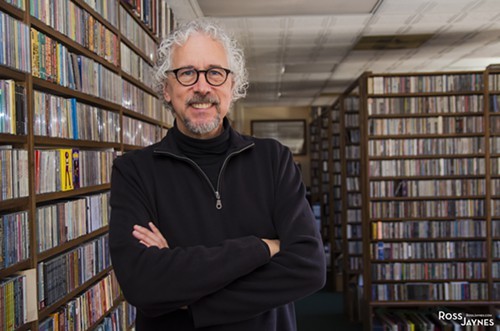You think you know how make a playlist? You need to settle down and listen to Rick Clark. Clark is currently the music editor at the Oxford American. He has programmed seven of the magazine’s iconic music issues. I talked with him for a while about assembling the latest in the state-by-state series of Southern music samplers. Clark talked about the fundamental challenge of organizing Tennessee’s bipolar musical output in light of the state’s complex culture. He knows how to assemble songs, and the “Tennessee” issue is wonderfully Memphocentric. Here are four steps to making a slamming playlist like a pro.
#1. Know what the heck you’re doing.
Clark: My first paid gig as a musician was in 1969. I was writing songs and working in a studio by the middle ’70s. I worked at Pop Tunes in the 70s and had shows on WLYX for a number of years. All of that experience culminated into a situation where I fell into writing in the 1980s. Besides writing, I had sort of a rep among certain people in Memphis during the ‘70s and ‘80s. I programmed all of the music for TGI Friday’s, the Bombay Bicycle Club, the Peabody, rock-and-roll clubs, urban cowboy shit, punk rock, German restaurants, Japanese restaurants. So I got a rep for being the guy who could program music, who could choose music.
#2. Know the right people.
Clark: The Oxford American thing would never had happened if it hadn’t been for Jim Dickinson. So when Jim was in discussions with Marc Smirnoff about this idea for the music issue and CD idea, Jim recommended me. That’s how it happened. I wrote liner notes on Big Star Third and the Number One Record/Sister Lovers twofer CD. I recorded with Alex on a number of things with Alex. Some of which I regard as the worst stuff he ever did. It was more colorful as the experience.
#3. Develop themes.
The Journey
Clark: Trying to address Tennessee is the most daunting task of any of the Southern states. Unlike any other state, there’s no music industry center. Nashville and Memphis make Tennessee ground zero for some of the most important and influential music of the last century. It’s insane. One of the things that I had to address is the nature of Memphis and Nashville being the centers that they are. It wouldn’t be capturing a big part of the story if I didn’t acknowledge and address the journey to these places. If I just had artists that were born in Tennessee, I don’t think that I’d be telling the story. Al Greene, Elvis, a huge chunk of Texas moved to Nashville in the last 40 years. I had to have the narrative of the journey, the pilgrimage aspect.
Complexity and Loss
Clark: While the lines of demarcation seem apparent to most people, the cross pollination is important. I was going for the smear between Nashville and Memphis. It’s interesting; the DeVilles were looking for a white lead singer who sang like a black guy. They found Alex Chilton singing at the Central High Talent Show. One of the songs he sang was by [Bobby Hebb] a black guy from Nashville, who had actually played with Roy Acuff in the Grand Ole Opry. “Sunny,” which has always been one of the most interesting hits of the 60s. He wrote it in the wake of his brother’s murder. It was shortly after JFK had been murdered. It appealed to trying to keep a positive disposition in trying times. It’s almost like a jazz song in many ways. It’s an attempt to highlight the many complexities of Tennessee.
#4. Mix the dang thing up.
Clark: I could easily have filled the CDs with big artists or with big hits from homegrown Tennesseans. I’ve always felt on these CDs that the little chestnuts that you don’t know about share the same air as the well known artists. To have them side by side on these CDs is a way of dignifying their equal importance. Their equally worthy. So that’s why Van Buren or Tommy Hoehn would be on this CD with Johnny Cash, and Elvis Presley, and Al Green. In some ways a more familiar artist is always served as a kind of emotional palette cleanser. If you do two CDs of stuff that’s only obscure, the emotional landscape flattens out.
